Aviation Security Service (AvSec) carries out a range of security functions and activities, including screening airport workers, passengers, crew and their baggage, as well as guarding aircraft and patrolling at airports around New Zealand.
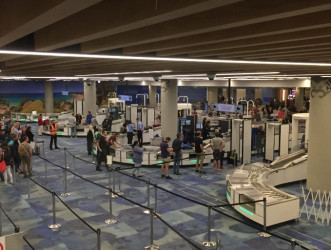 All departing international passengers and their carry-on baggage are screened, as is their checked-in baggage.
All departing international passengers and their carry-on baggage are screened, as is their checked-in baggage.
All departing domestic passengers and their carry-on baggage at security-designated airports are screened, where an aircraft has 90 or more seats.
Passengers and their carry-on baggage are screened to ensure prohibited items such as knives, firearms, incendiary devices, weapons, dangerous goods, explosives, and other threat items are not carried onto the aircraft. Screening on international flights also ensures passengers do not take more than the allowed quantity of powders, liquids, aerosols and gels (PLAGs) into the aircraft.
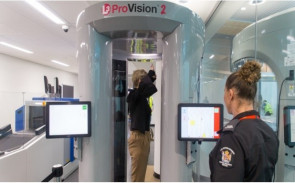 Passenger screening has traditionally been undertaken with walk-through metal detectors. In 2019, AvSec started introducing advance imaging technology (AIT) body scanners. Body scanners emit low-intensity electromagnetic waves that do not penetrate human skin but are able to detect prohibited items worn or carried on a person, whether made of metal or not.
Passenger screening has traditionally been undertaken with walk-through metal detectors. In 2019, AvSec started introducing advance imaging technology (AIT) body scanners. Body scanners emit low-intensity electromagnetic waves that do not penetrate human skin but are able to detect prohibited items worn or carried on a person, whether made of metal or not.
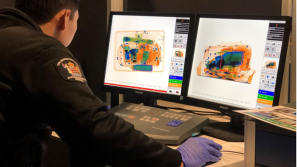 For cabin baggage screening, AvSec will be rolling out Computed Tomography, or CT scanners, to replace older x-ray technology. This enables three-dimensional imaging to help improve the detection of prohibited items and explosives. Internal baggage content can be examined on screen from a range of angles, and to higher resolution than previously. In addition, the new technology also comes with improved automated detection capabilities, which are based on AI technology, to further enhance and improve threat item detection.
For cabin baggage screening, AvSec will be rolling out Computed Tomography, or CT scanners, to replace older x-ray technology. This enables three-dimensional imaging to help improve the detection of prohibited items and explosives. Internal baggage content can be examined on screen from a range of angles, and to higher resolution than previously. In addition, the new technology also comes with improved automated detection capabilities, which are based on AI technology, to further enhance and improve threat item detection.
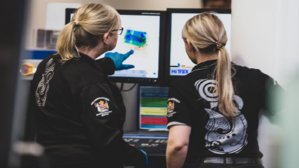 Such CT technology also brings with it better explosive detection capabilities and passenger facilitation and efficiency benefits, including the potential ability for travelling passengers to leave large electronic devices and powders, liquids and gels in their carry-on baggage, subject to final regulatory approval. All of these items are currently being required to be removed from the bags for screening.
Such CT technology also brings with it better explosive detection capabilities and passenger facilitation and efficiency benefits, including the potential ability for travelling passengers to leave large electronic devices and powders, liquids and gels in their carry-on baggage, subject to final regulatory approval. All of these items are currently being required to be removed from the bags for screening.
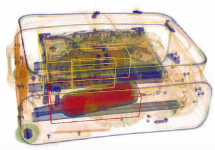 Hold stow baggage screening currently includes a combination of x-ray screening and supporting explosive trace detection scanning.
Hold stow baggage screening currently includes a combination of x-ray screening and supporting explosive trace detection scanning.
As with AvSec’s cabin baggage technology upgrades, the x-ray scanners for hold stow baggage are being upgraded to computed tomography (CT) scanners.
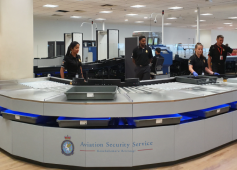 Automated smart lanes are being progressively rolled out across New Zealand’s tier 1 airport’s domestic and international security checkpoints.
Automated smart lanes are being progressively rolled out across New Zealand’s tier 1 airport’s domestic and international security checkpoints.
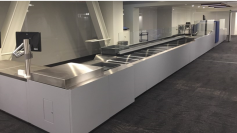 Smart lanes have a number of efficient features including automated tray return systems and the ability for several passengers to unload their items at once, helping speed up the queues. Smart lanes will help improve security, help speed up passenger screening processes, and improve passenger experience.
Smart lanes have a number of efficient features including automated tray return systems and the ability for several passengers to unload their items at once, helping speed up the queues. Smart lanes will help improve security, help speed up passenger screening processes, and improve passenger experience.
From early 2021 these automated smart lanes will also include UVC sterilisation technology to help combat against the risk presented by pathogens such as COVID-19.
We undertake screening of airport workers with access to, and within security enhanced and restricted areas at designated airports, as well as managing the National Airport Identity Card system for airport workers.
We also screen air cargo and outbound international air post to help ensure the safety and security of passenger’s onboard planes this travels on.
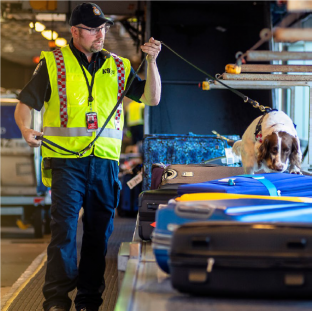 We undertake a range of patrols of airport perimeters and airport facilities at security-designated airports. Patrols cover both landside and airside areas of airports (e.g., terminal buildings, check-in counters, arrival and departures halls, air lounges, security restricted areas, the tarmac, baggage handling areas and navigation facilities, to name just a few).
We undertake a range of patrols of airport perimeters and airport facilities at security-designated airports. Patrols cover both landside and airside areas of airports (e.g., terminal buildings, check-in counters, arrival and departures halls, air lounges, security restricted areas, the tarmac, baggage handling areas and navigation facilities, to name just a few).
We also guard aircraft, perform aircraft searches and escort duties.
These activities help to ensure the prompt interception of persons unlawfully in security areas, and increase the safety and security of the flying public.
Given AvSec’s specialist skills and capabilities we are sometimes assigned to support the NZ Police with their duties. Security support deployments with Police can include:
The Airport Identity Card (AIC) system forms an important part of the New Zealand aviation security system, including AvSec’s non-passenger screening activities at security designated airports. It has a preventative security focus in that checks are undertaken prior to workers obtaining authorisation to work at airports. A comprehensive and effective AIC system helps ensure airport environments and aircraft travel is safer and more secure, as workers have undergone background checks as part of getting their AICs. Background checks can include information being disclosed to AvSec from:
AvSec operates this identity card system on behalf of the Civil Aviation Authority.
If you have any questions about this topic, use our contact form, or email reception@avsec.govt.nz.